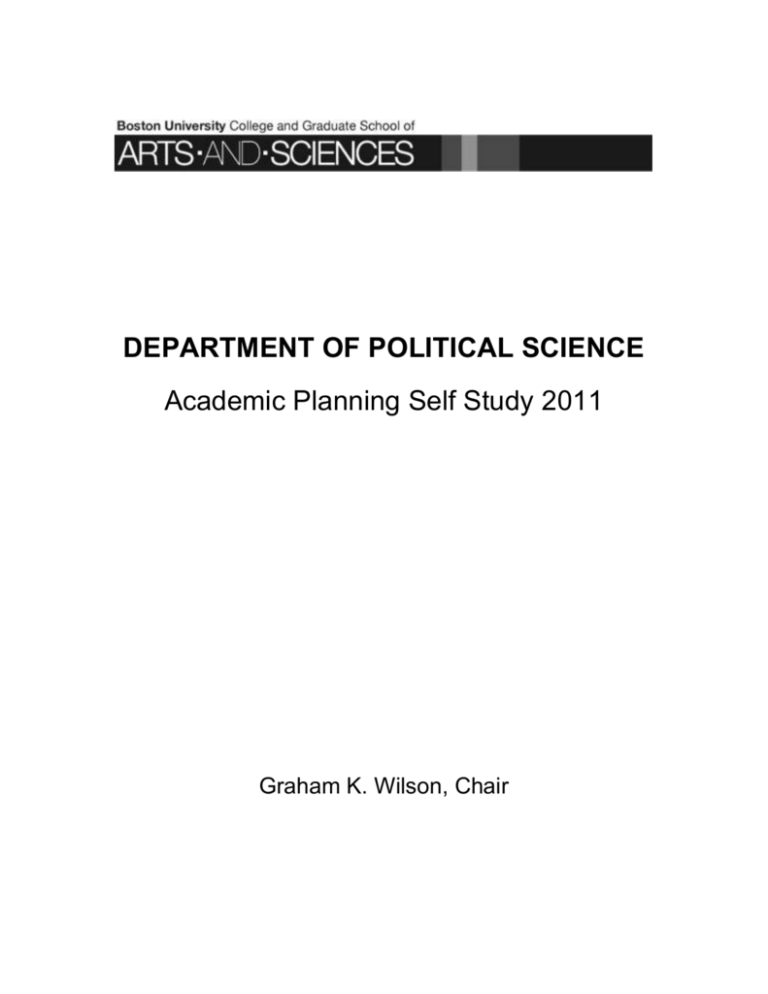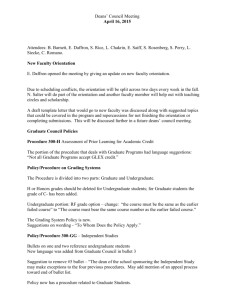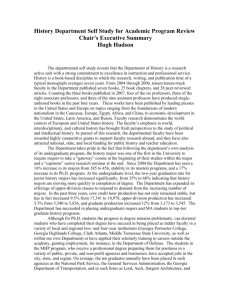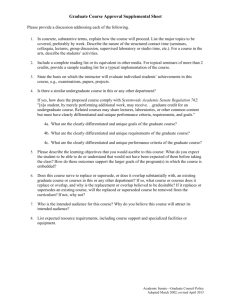department of political science
advertisement

DEPARTMENT OF POLITICAL SCIENCE Academic Planning Self Study 2011 Graham K. Wilson, Chair STEP I. THE CURRICULAR CONTEXT A. Degrees and Minors offered by your program, individually or jointly 1. List all undergraduate and graduate degrees offered by your program (i.e. BA majors, Masters degrees, doctoral degrees) and all joint degrees for which your program is responsible. BA in PO (CAS students), BA/MA in PO, BA in PO as part of BUCOP (CAS/COM/SMG), MA in PO, PhD in PO. 2. List all undergraduate minors offered by your program. Minor in PO (CAS); minor in PO (other undergraduate units) (NOTE: on the MA and the BA-MA) The Political Science Department graduate program is not currently admitting students to its MA program. This might change if rumored changes in University policy on tuition take effect. We have had some initial discussions about what the MA might look like if reactivated and it is likely that one option would be for us to take advantage of the skills of recent faculty hires in campaigns, elections and public opinion this offering a more professionally orientated degree than in the past. Such a focus would insure no overlap with the Department of International Relations’ offerings. However, until University policy is clarified, this remains highly speculative. The Department does in theory already offer an MA for Professionals for individuals who are employed in a professional career in a related social science or enrolled in a related social science, legal, or public affairs program. Students must successfully complete eight courses, including two graduate core courses and write a policy paper under the supervision Political Science Department 2 of a faculty member. However, this MA has also not been active in recent years. The BA/MA program is intended for outstanding students who have completed four political science courses, including a 500 level course or above with a GPA of 3.7 or above in these courses and an overall GPA of 3.5 who wish to pursue intensive study in a specialized area of political and social science beyond the level of the BA. Students must apply for admission into this program before March 1 of their junior year. The requirements for the BA/MA degree are the same as the Master’s Program for Professionals except that written comprehensive examinations in a major field, minor field and subfield replace the policy paper. We should also note that our majors can now apply for admission to an Honors (in the major) program. An outstanding academic record in both political science courses and in the overall GPA is required. Students must take PO 502 (a research methods course), write and defend a substantial thesis as well as engage in co-curricular activities giving experience of practical politics such as being an intern or working on a campaign of the student’s choice. Students are required to reflect on the relationship between their experiences and political science literatures. A Ph.D. is offered to students with either a BA or MA in political science or the equivalent. Students admitted to the Ph.D. program with a BA degree are required to complete sixteen graduate-level courses. Students admitted to the Ph.D. program with an MA degree are required to complete between eight and twelve graduate level courses, depending on how closely their prior work parallels the courses required for a Ph.D. in Political Science. Students entering the program must develop a minimum level of competence in three of the five sub-fields of Political Science. Political Science Department 3 Students entering the program with a BA must take three of the five core courses. For those students entering the program with an MA, one or more of these Core Courses may be replaced, subject to the approval of the Director of Graduate Studies. In such cases, however, post-MA candidates must take a total of eight to twelve courses. All students enrolled in the Ph.D. program must fulfill a methodology requirement by taking two qualitative and quantitative methods classes. (Degree requirements for all PhD’s include course work, qualifying examinations in a major field, minor field and subfield, proposal defense and dissertation defense). B. Undergraduate majors offered by other departments and programs that depend on coursework in your program 1. Undergraduate Majors in CAS: Using the listing of BA programs on pp. 64-65 of the 2007/2008 Undergraduate Bulletin to ensure completeness, list all CAS majors other than those administered individually or jointly in your department whose requirements (as spelled out in departmental sections of the bulletin) mean that students in those programs need to take coursework in your department. As a result of the comprehensive course audit conducted with the Department of International Relations and subsequent cross listing of courses, many PO courses now are cross listed with them and vice versa. East Asian Interdisciplinary Studies American Studies Environmental Analysis and Policy Joint concentration in Philosophy and Political Science (offered and administered by CAS/PH) Latin American Interdisciplinary Studies Political Science Department 4 Russian and Eastern European Interdisciplinary Studies (the interdisciplinary majors, to varying degrees, list PO courses among their components, rather than absolutely requiring them—note that many of these will be cross-listed IR/PO courses.) 2. Undergraduate majors and degrees outside CAS: Using the list of BU Schools and Colleges on page 4 of the current Undergraduate Bulletin, list all non-CAS undergraduate degree programs whose requirements (as stated in the Bulletin) include coursework in your department. None require specific PO coursework. Several specify PO courses in lists of those acceptable for fulfilling “distribution/depth” requirements. ENG lists the 200-level core courses; SED specifies “at least three” courses in the “social or behavioral sciences;” COM (outside BUCOP arrangements) notes “two courses in the social sciences,” and offers a BS with a concentration in “politics.” Undergraduate minors: Using the listing of CAS-approved minors on pp. 66-67 of the Bulletin, list all (CAS and other) minors whose requirements can be fulfilled by required or elective coursework in your department. It is important to note that a joint comprehensive course audit conducted in 2010 with the Department of International Relations resulted in a considerable increase in cross listing of undergraduate courses between the departments. This provides a substantial increase in opportunities for majors in both Departments. We await with interest the implications of this for our enrollments. Political Science Department 5 Political Science African Studies African-American Studies American Studies East Asian Interdisciplinary Studies International Relations Latin American Interdisciplinary Studies Russian and Eastern European Interdisciplinary Studies Women’s Studies C. Graduate programs offered by other departments and schools that depend on coursework in your program 1. GRS Master’s Programs outside your department. Using the chart on pp. 2-3 of the 2007/2008 Graduate Bulletin, list all Master’s degree programs whose requirements (as spelled out in departmental sections of the bulletin) include coursework in your department. Several tracks within IR’s MA programs include 500+ level courses; none are required, as such. 2. GRS Doctoral Programs. Using the chart on pp. 2-3 of the 2007/2008 Graduate Bulletin, list all doctoral programs whose requirements (as spelled out in departmental sections of the bulletin) include coursework in your department. None 3. Non-GRS Graduate Degrees. Using the list of Schools and Colleges on page 4 of the Undergraduate Bulletin, list any non-GRS graduate programs whose requirements include coursework in your department Political Science Department 6 None D. College Requirements and Programs: Writing, Foreign Language, Math, General Education (Core Curriculum, and Divisional Studies, including Honors) In general, all departments and programs have responsibilities for selected aspects of the CAS curriculum that go beyond the major. Describe your department’s typical role in any of the following in which it has participated. (In what ways has your department contributed? To what extent)? For any aspect in which your department (including through individual faculty) has not played a recent role, enter “None.” 1. Core Curriculum Prof. Swanson has, from time to time, offered the Core social science (CC 203) course. 2. College Honors Program Professor Kriner has taken on responsibility for a quantitative reasoning course within the Honors College. As noted above, we have created an Honors in the Major program and have admitted the first students. As it includes a requirement for honors students to take a research design course (PO 502) this course therefore needs to be offered annually. 3. Teaching seminars toward fulfillment of the College Writing requirement PO graduate students regularly serve as Writing Fellows. 4. Implementation of the foreign language requirement Political Science Department 7 None 5. Offering Divisional Studies courses that also serve as gateways to your major(s) Our subfield “core” courses (211, 241, 251, 271 [provided to PO by the IR dept], 291) are all listed. 6. Offering Divisional Studies courses that do not also count toward majors in your department or division None 7. Offering selected courses that are not important for fulfilling requirements for your major(s) or minor(s), but which are in very high demand by students because of their interests. RE: “very high demand.” Theoretically, one COULD do a PO major while avoiding American politics—both the 211 core course and the follow-on 3- and 500-level courses—but “American” is very popular, and our PO majors and minors have to compete with students from other colleges to get into American courses, particularly our law related courses such as PO 315, PO 513 and PO 514. 8. Any other aspects of the CAS curriculum you want to mention None STEP II. ASSESSMENT OF SPECIFIC COURSE NEEDS Parts A & B: OBLIGATIONS TOWARD UNDERGRADUATE AND GRADUATE EDUCTION: EACH SEMESTER: Undergraduate Political Science Department 8 PO 271—Introduction to IR—needs to be offered each semester as it is the introductory course required for the numerous majors and is also a very popular choice for Political Science majors who must take at least three of our five introductory courses. IR, faculty generally alternate in teaching it, on the IR budget; the TFs for 271 are supplied by PO out of its resources. We believe that the Political Science International Relations specialist we are hiring this year should participate in teaching this course as well as more advanced courses (including at the graduate level) on contemporary approaches to the study of International Relations a subfield of Political Science) should also ( this case as in common usage meaning a subfield of political science.) *PO 211—Introduction to American Politics. This course can attract a substantial number of students (meaning over one hundred) every semester. Our current thinking is that it would be better to offer the course once a year enrolling over two hundred students and using the resources saved to offer another course. However, we do make willingness to teach this course a requirement in all hiring in the American politics field and we now have a team of people able and willing to teach it. Graduate---none ONCE A YEAR: Undergraduate PO 211: Intro to American Politics PO 241 Intro to Public Policy, (if not offered each semester) PO 251 Intro to Comparative Politics Enrollments in this course have been substantial. It was long taught by Professor Perez, more recently by Professor Wilson and (for the last two years) by Professor Boas. While not all faculty in the Comparative section of the department realize that they share the obligation to teach the course, Political Science Department 9 we are making progress and another recent addition to the department, Professor Longman, has made clear his willingness to teach it. PO291: Intro to Political Theory. There is considerable demand for these courses from students across the College and University who will major in other subjects. However, we should also note that as our own majors are required to take at least three of our introductory courses, this is close to the minimum possible number of such courses that we should offer. Beyond these, the following are courses whose enrollments over the last few years indicate sustained demand—roughly 20/+. The list encompasses lecture courses, as well as seminars whose enrollment limit is 20: they are labeled by subfield. 300: Selected Topics in American Politics, American 302: Elections Around the World: This exciting offering had been developed by our new colleague, Professor Boas and we anticipate that it will build a large enrollment. 315: Judicial Process A: Will be offered regularly by our recent hire, Professor Glick. 317: Presidential Leadership, A 318: US Political Parties, A 324: US Media and Politics: This course used to be given a lower priority but it is central to the teaching interests of one of our new hires, Professor Christenson. We expect his course to have great appeal to students and this course in particular draws from both within CAS and from other schools. We plan to allocate one of our TFs to the course . 341: Comparative Public Policy, [Pub pol] Political Science Department 10 351: Politics of Race and Ethnicity, C[omp] This might well be used by the Americanist we are hiring this year. 352: North-South Relations, C (meets with IR 395) 361: European Politics, C 364: Politics of Post Communist Russia, C (Meets with IR 364) 366: US Foreign Relations, IR (meets with HI 366) 367: Intro to Latin American Politics and International Relations, C/IR (Meets with IR 367) 369: China: From Revolution to Reform, C (meets with IR 370) 372: Conceptual Foundations of International Relations, IR (meets with IR 360) 375: Russian/Soviet Foreign Policy (meets with IR 375) 395: The European Enlightenment, T[heory] (meets with HI 314) 502: Needed annually by our honors students. 509: Latin American Political Parties: This is offered by our new colleague, Professor Boas and we anticipate that it will attract many students. 510: Separation of Powers, A 512: Informal Political Processes, A 513: American Constitutional Law, offered by our new hire, Professor GLick 514: Judiciary and Civil Liberties, A 518: American Politics and Use of Force, A 544: Public Opinion and Interest Groups, A 548: Politics of Education, P Political Science Department 11 577: Negotiation and World Affairs, IR 625: Political Movements in America, A 674: US as a World Power, IR 391: Classical Theory, T* 392: Modern Theory, T* ** These two political theory courses constitute a special category— currently, Prof. Swanson offers them in alternating years—they are required for the joint concentration in philosophy and political science (overseen by PH), and thus must be offered within a major “cycle.” Given her other teaching obligations, Prof. Swanson cannot offer both each year, but were we able to do so, enrollments would justify offering them annually. By shifting enrollment-classification criteria up or down a bit around the 20student notch, this list could be lengthened or shortened—the point is that these courses do combine “demand” in numerical terms with a necessary spread across the subfields. Graduate: There are five substantive courses that we must offer each year to make it possible for our students to comply with the requirements for the Ph.D. These are: GRS PO 711: Approaches to the Study of American Politics PO 741: Public Policy Analysis PO751: Approaches to the Study of Comparative Politics PO 771: Approaches to the Study of International Relations Political Science Department 12 PO 791: Approaches to the Study of Political Theory: but we believe we can “get by” teaching it less often. Ideally we should build a partnership with Philosophy to help here. We also need to teach two required methods courses, PO 840 and 841. Many of our faculty would like to see us offer annually a further methods course, PO 843 currently being offered by Professor Christenson. The courses necessarily have a small enrollment which we may be able to increase somewhat by expanding the size of the BA/MA program (its students are required to take some graduate level courses). The “opportunity costs” of offering PO 843 annually have caused us to decide to offer it bi-annually; the trade off is between a professor teaching an handful of graduate students each year or a larger number of undergraduates. We are actively engaged in discussion on collaboration with other social science departments on methods teaching and as noted elsewhere have used a Sociology course to cover for Professor Gerring’s leave. We hope that discussions coordinated by the College on this topic will progress. However, the seven other courses are essential to maintaining an adequate Ph.D. program. ONCE EVERY TWO YEARS: We noted earlier that the course audit conducted jointly by International Relations and Political Science had increased considerably the number of cross listed courses and that we are not sure what the implications of this for student numbers will be. Certain 300 and 500 level courses already generate more student numbers than others —e.g., post-Soviet/Russian/Eurasian courses offered by Connor (100% on the PO budget), China-related offered by Fewsmith, and Latin American by Palmer (both 100% on the IR budget) because they are crosslisted between PO and IR. Political Science Department 13 We list below 300-5/600 level courses that have ---over the last few years generally gathered fewer than 20 enrollees (not including cross-listed PO-IR courses whose two lists add up to 20), and/or ---been offered less than annually ---are of relatively small enrollment and taught typically by department members whose retirement intentions have been announced, or whose retirements might be reasonably anticipated over the next five years 324: US Media and Politics, A: This course has been moved to the “every year” category for the reasons noted above. 325: Judicial Politics, A: We anticipate this course being offered regularly by Professor Glick. 363: Soviet Politics, 1917-1991 (meets with IR 363) 365: Pacific Challenge, C (meets with IR 275) 502: Political Analysis, M[methodology]: If the Honors proposal we are discussing is adopted this would be taught annually, Professor Christenson is eager to add it to his repertoire. 504: Political and Cultural Foundations of Human Development, IR 521: Democratic Governance, C 523: Global Justice, C 551: Comparative Political Development, C 559: Reckoning With the Past: Reparations and Justice in a Comparative Perspective, C (meets with AA 559) Political Science Department 14 564: From Slavery to Freedom: Abolition in a Comparative Perspective, C (meets with AA 564) 565: Government and Politics of Contemporary Africa, C 566: Political Systems of Southern Africa, C 573: Islam in Middle East Politics, IR (meets with IR 509) 579: Japan in International Politics, IR (meets with IR 579) 581: National Development and International Politics, C 586: Nationalism in Post-Soviet Eurasia, IR 599: Freedom, T 621: Political Economy of Advanced Industrialized Societies, C 657: Problems in Comparative Analysis, C 661: Continental Western European Governments, C 676: Political Biography, IR 691: Seminar in Political Philosophy, T 693: Enlightenment and Its Critics, T (meets with HI 514) STEP III. PLANNING FOR EFFECTIVE, EFFFICENT, EQUITABLE, and SUSTAINABLE COURSE STAFFING The grid entitled Projected Schedule and Staffing, 2011-2013 lays out our “reading” of future staffing over the next two academic years. For the next three years: Undergraduate Core Courses: PO 271-- will be offered every semester, alternating between faculty in the Department of International Relations and the new hire we are making this Political Science Department 15 year. We may seek to hire in this area and would expect that if we did so, the successful candidate would teach this course as well as more advanced undergraduate and graduate courses. PO 211. This course has been taught by Professor Reeves for three years at his own request. It is being taught this year by Professor Wilson. We make willingness to teach this course a requirement for all new hires in American politics and so our recent new hire (Professor Christenson) and Glick are willing to teach it. We anticipate that this will also be true of the Americanist we are hiring this year. As we discuss below, we believe that when possible a number of professors in the field should take their turn in offering a large introductory course such as this rather than it being viewed as the responsibility (and ultimately perhaps the burden) for a single colleague. PO 241—will be offered every year, by Professor Rossell PO 251—will be offered every year: We believe that the course should not be dependent on a single professor’s willingness to teach it as in the past with Professor Perez teaching it for many years but that it should alternate amongst a number of professors in the Comparative field. Professor Wilson taught the course in 2009 and it was taken over by Professor Boas 2010. We are still developing awareness in the Comparative field that everyone has a responsibility for this course. PO 291---will be offered every year, either alternating between Professors. Schmidt and Swanson, as generally in the past Graduate Core Seminars (ALL to be offered annually) PO 711—Professor Kriner the “primary,” may share with Professors Reeves, Christenson, and Wilson PO 741— see 241, above, for arrangements PO 751---This is being taught at present by Professor Martina but was previously taught by Professor Gerring (currently o n leave.) These two Political Science Department 16 professors with the addition of Professors Boas and Perez provide good coverage for this course. PO 771—Professor Crawford expressed interest in teaching this course but may be on leave. Our new hire in international relations should be able to cover this course. PO 791—Prof. Swanson will handle this for the next several years. We expect there to be considerable changes in our course offerings in the next few years. The hires we anticipate making this year in American and politics and international relations would probably use existing course number. In the longer term, the people hired would contribute to the teaching of PO 211, PO 217 and PO 723 and PO 771. It is, common however, for new hires to receive a one course teaching release. As we noted above, the course audit conducted with IR and the subsequent increase in cross listed courses may have a large impact. Our majors (and those in IR) will have many more opportunities; courses that might have had insufficient enrollment in the past may become viable and others overenrolled. We shall have to monitor the results of this very desirable development and adapt to them. There is a strong feeling among many of the faculty that we should be offering more methods training at the graduate and possibly undergraduate level. While there is indeed a good case to be made for this, we must also bear in mind the opportunity costs of committing faculty to such methods courses which generally have a small enrollment even though we have tried to recruit students from other departments. A faculty member teaching an advanced methods course to six graduate students could instead be teaching undergraduates. We hope that discussions about methods training across the social science department will advance and we have younger colleagues with proven skill in teaching such courses who could also service other departments’ needs. In addition to be active an active participant in these discussions we have already taken concrete steps such as encouraging our Political Science Department 17 graduate students to take a Sociology Department qualitative methods course to replace the course offered by Professor Gerring (currently on leave.) Projected Schedule and Staffing, 2011-2013 Political Science Department Professor Bustin S 12 PO **** 271 PO PO 251 302 PO PO 841 509 Retired Retired Christenson PO 324 Berger Boas Clemens Connor Corgan Crawford Fewsmith Gendzier F 11 PO 300 PO 843 Retired Retired Sab Sab Sab Sab PO 271 ***** PO PO 559 564 PO PO 9** 796 PO PO 369 558 PO 578 PrePO Retire 551 Political Science Department F 12 S 13 F 13 *** PO 271 **** PO 251 PO302 PO 251 PO841 Retired PO 509 Retired PO 5** Retired PO 502 PO 324 PO 610 PO 610 Retired PO 363 PO375 PO 843 Retired PO 364 PO 6** PO 8** Retired PO 363 SO 324 ***** PO 271 PO 271 PO 559 PO 796 PO 559 PO 670 PO 6** PO 670 PO 369 PO 558 PO 369 PO 578 PO 578 Retired? Retired? Retired 18 Gendzier Gerring New Hire Kriner Longman Martin Mayers Palmer Perez Reeves Rossell PreRetire PO 521 PO 840 PO 560 PO 523 PO 751 PO 771 PO 574 PO ***** 372 PO PO 317 518 PO PO 9** 510 PO PO 565 760 PO PO 742 341 PO 366 HI 200 PO 767 PO 568 PO 361 PO 853 PO 211 PO 711 PO 548 PO 741 Political Science Department Retired? Retired? Retired PO 521 PO 523 PO 502 PO 840 PO 751 PO 840 PO 771 PO 574 PO 771 ***** PO 372 ***** PO 317 HCS PO 317 PO 518 PO 510 PO 711 PO 760 PO 587 PO 760 PO 742 PO 343 PO 341 PO 621 PO 318 PO 843 PO 676 PO 759 PO 366 PO 674 Retired Retired PO 361 PO 361 PO 661 PO 854 PO 561 PO 361 PO 211 PO 300 PO 211 PO 526 PO 532 PO 526 PO 548 PO 241 PO 548 PO 741 PO 641 PO 641 PO 674 PO 366 HI 200 PO 674 PO 787 Retired PO 661 PO 854 PO 211 PO 526 PO 241 PO 641 19 Schmidt Silverstein Swanson Wilson Glick Sab Retired PO 599 PO 691 PO 311 Sab Retired PO 291 PO 791 PO 544 PO 513 PO 325 PO 315 PO 349 PO 395 Retired ***** Retired PO 395 Retired PO 391 PO 392 PO 391 PO 691 PO 791 PO 691 PO 544 PO 537 PO522 PO 311 PO 211 PO 315 PO 513 PO 513 PO 514 PO 325 Explanatory notes to the “GRID” (2010) 1. Retirements: Professors Zisk and Bustin retired and Professor Clemens retired from teaching. Both Professors Palmer and Silverstein will retire, by current arrangements, 8/31/2012. Professor Gendzier is also teaching a final sequence of courses. 2. Professor Boas designed two new courses, 302 and 509, on campaigns and elections in comparative/world perspective, and on elections and political competition in Latin America. As noted above, he also took over the Introduction to Comparative Politics course, PO251 a.nd the graduate methods curse (PO841) in the absence of Professor Gerring 3. Professor Christenson has played a major role in teaching methods at the graduate and undergraduate levels. He also teaches courses in the that will attract a considerable undergraduate enrollment. Political Science Department 20 STEP IV 2011 EXECUTIVE SUMMARY/ UPDATES / TEN-YEAR PLANNING 1. UPDATES Professors Bustin and Clemens retired or retired from teaching. Professor Gendzier is in the process of retiring, as is Professor Silverstein. Professor David Glick joined the department in July 2011. Professor Tim Longman received tenure. We are expecting to bring in candidates for the American politics and International Relations positions in November. 2. GOALS AND PLANNING These are exciting times in Political Science at Boston University – both for the Department and for the discipline. A sequence of highly successful hires at the assistant professor level has brought new energy, modern approaches to the discipline and a greatly enhanced spirit of collegiality to the department. Assuming that we are able to recruit similarly able and collegial people in our assistant professor searches this year, thanks to the support of the College, the Department will have been transformed in a very brief period. The revived Department is at the core of the Graduate Faculty of Political Science (GFPS) that brings together political scientists from several CAS departments and the Law School. The GFPS makes clearer to our current students, potential students and the international political science discipline that BU is a major player in political science. Not many departments in the USA match or exceed the strength of the GFPS in numbers or quality. Political Science Department 21 At the undergraduate level, the recently completed joint course audit with the Department of International Relations has opened many new opportunities for majors in both departments. The Department’s new honors program offers very challenging and varied opportunities to our very best students. Goals The Department’s first challenge is to consolidate these gains. First, we need to hire as well this year as in the recent past. Second, we must foster the success of our current assistant professors and support their efforts to build collegiality, for example in informal faculty/graduate student workshops. Third, the GFPS must become a reality. The first meeting of the GFPS is scheduled for October and should start the process of turning what is an impressive group on paper into an organic institution. Fourth, we need to continue to build intra departmental structures for planning courses and coordinating our course offerings Future Goals The first goal must be to retain high quality and productive faculty in the face of competition for their services from other universities. We firmly believe that in this instance, preemption is better than defense; we – the University and College – must do everything possible to make it less likely that outstanding scholars will seek outside offers. Second, we must continue to bring fresh blood into the Department avoiding the feelings of stagnation and decline that characterized it in the past. We anticipate on the basis of past assurances from the College that we shall be allowed to recruit again in 2012-13. This would be the final replacement hire arising from the sequence of retirements (Silverstein, Political Science Department 22 Gendzier, Bustin, Clemens) negotiated by the College. Looking further down the road, it is reasonable to anticipate that two further retirements (Wilson and Connors) will take effect by 2017. There should therefore be the possibility of continued hiring in the medium term. The Department will need to discuss this year how far it has come in fulfilling its strategic plan goal of building the American politics field. A substantial group (Glick, Christenson, Reeves, Kriner plus pasts of Wilson and Martin) now exists. There is certainly scope for adding to this group, for example by hiring an expert on Congress or on the policymaking process. With the addition of a new hire this year, it is possible that other needs might be given top priority. Some would argue that a new Comparativist is needed although the presence of several Comparativists in the GFPS who are based in the Department of International Relations should be taken into account. It is unclear whether modest student enrollments in political theory courses is a result of limited interest in that field in general or whether a new hire might attract larger numbers than do current faculty. Closer analysis of national trends might help. Third, if the University revises its policies on funding graduate students, we should take advantages of the changes to make our Ph.D. program more competitive in attracting the best applicants. The minimum industry standard is five years of guaranteed funding. Either through University awards or through revenue generated through a revived MA program, we need to be able to offer the same as other Ph.D. programs. Moreover, we need to be able to offer a reasonable number of packages every year. We cannot build a stronger program fluctuating between years of minimally sufficient numbers of five year packages and years of manifestly inadequate (i.e. one or two.) With a well structured Ph.D. program and the GPFPS in place, we have done our part; we now await the University’s new policy on funding graduate students. Political Science Department 23 In order to support all our activities better, we need to continue the long process of building alumni support and gifts. We have taken the obvious initial steps; we will attempt to progress as rapidly as is possible/ In conclusion, the central missions of the Department remain unchanged. They are: 1. As part of its commitment to liberal arts and civic education, to provide large introductory courses for the College and University enrolling many students who will major in other disciplines often outside CAS. 2. To provide an adequate range of courses for students in our very large major. 3. To maintain an adequate number and range of courses for our Ph.D. students and good supervision for dissertators. 4. To advance knowledge in our discipline through research. FY 2011 Supplemental Budget Requests If, and only if Professors Mayers, Martin and Crawford are successful in their quests for grants, and therefore on Leave of Absence, we would not offer most of their courses but would need a lecturers for PO 343 (Foundations of American Public Policy.) We are advised that Professor Boas’s application to the Humanities Foundation is not treated a leave request. However, if successful, we would have to re-assign two of his courses (PO 251 Introduction to Comparative Politics) and PO 841 Quantitative Methods) which are essential and seek a lecturer for his Latin American politics course PO 509, Latin American Political Parties. Political Science Department 24 Supplementary Budget Requests We have three needs relating to physical plant. 1. While we have had a great improvement in common areas such as hallways and in office for new faculty, we have a desperate need to improve conditions for longer serving and often senior faculty. The welcome policy of renovating offices for new, generally junior faculty necessarily results in more senior faculty using offices that are clearly inferior to those of new assistant professors, a situation that is clearly not good for morale. After surveying offices and consulting faculty, we have identified two that need urgent attention. We are advised that the cost of renovating each is $12,000 as estimated by CAS. 2. Professor Gerring needs a decent desk. We are advised that new furniture for his office would cost $3,000. 3. We need a modern seminar room that we use not only for teaching but for special events including job interviews. Most departments have adequate facilities for such events but we do not and have to ask other units such as African Studies if we can borrow their facilities. This scarcely makes a good impression on job candidates. Such a facility should include proper whiteboards and an overhead projector consistent with twentieth century IT expectations. The blackboards on wheels should be removed as a workplace hazard. We are advised that the cost of this work would be $3,000. 4. Modest investments in furniture are needed to complete the wonderful improvements in the areas used by graduate students. Political Science Department 25 While we – and the graduate students – are deeply grateful for the improvements made, they have the unintended effect of casting into sharp relief the filthy furniture carried over from the previous room. We are advised that the cost of the furniture required would be $5,000. While all of these requests are important and urgent, as items (3) and 4) involve public spaces, we would give them the highest priority. 5. While we have planned on using colleague coverage for most of the faculty leave/sabbatical requests we need to hire lectures for PO 343 and if Professor Boas receives a Humanities Fellowship, PO 509. We anticipate being able to hire form within the ranks of our own graduate students. Political Science Department 26







